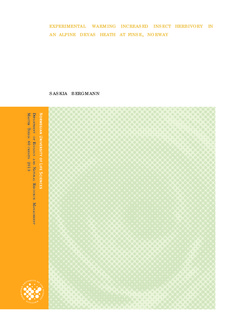Experimental warming increased insect herbivory in an alpine dryas heath at Finse, Norway
Master thesis
Permanent lenke
http://hdl.handle.net/11250/187027Utgivelsesdato
2013-09-23Metadata
Vis full innførselSamlinger
- Master's theses (INA) [593]
Sammendrag
Alpine ecosystems are particularly expected to experience changes due to temperature
rise, but little is known how insect herbivory may respond to that process.
I used two already established study sites at different elevations with control plots and
Open Top Chambers (OTCs) in a Dryas octopetala heath in the alpine ecosystem of Finse,
southwestern Norway, to investigate whether experimental warming does affect insect
herbivory. Leaf feeding damage was recorded in early and late summer and number of
insect herbivores counted by searching the plots; pitfall traps were used to map other
potential insect herbivores in the area. General Linear Models (GLMs) were used to
examine the effects.
Experimental warming increased the total amount of insect herbivory, mainly due to
plant species Dryas octopetala and Bistorta vivipara. Most insect herbivores were
Lepidoptera and Zygaena exulans was the most abundant species. Larvae of Z. exulans
were found in higher number inside as compared to outside the OTCs. The pitfall traps
indicated other potential insect herbivores.
This study suggests that some plant species such as Dryas octopetala and Bistorta
vivipara, are more susceptible than others to insect herbivores with temperature rise.
Concluding that insect herbivory may have important impact on species composition
and ecosystem functions.
